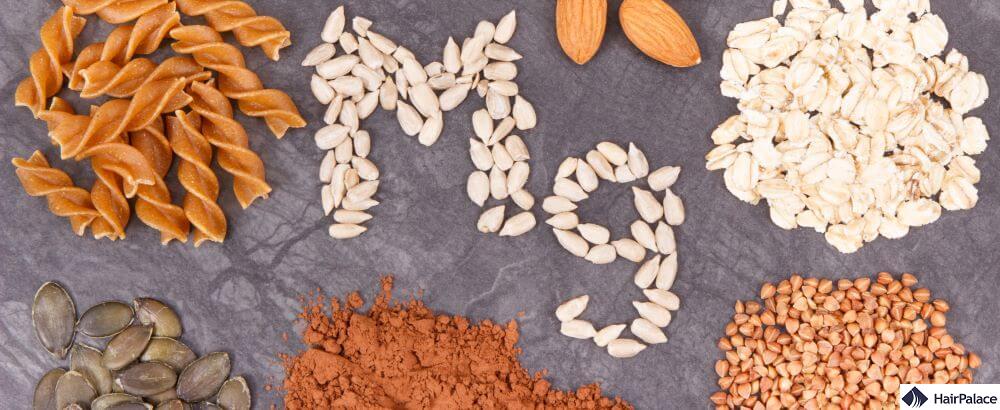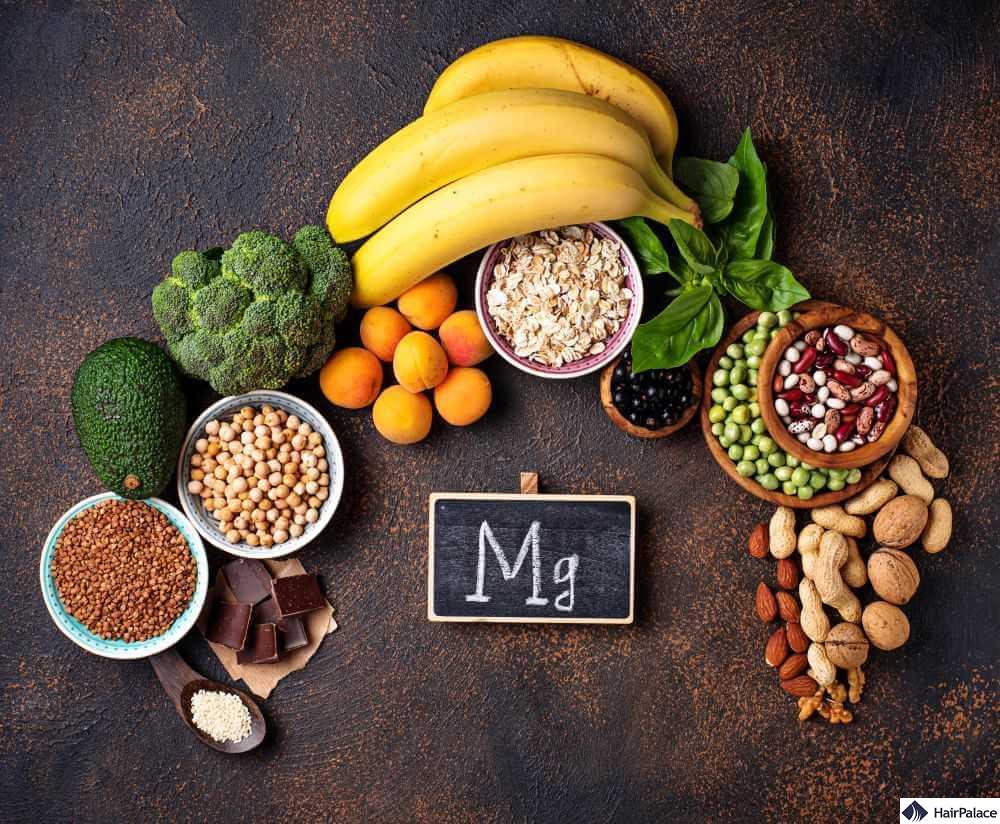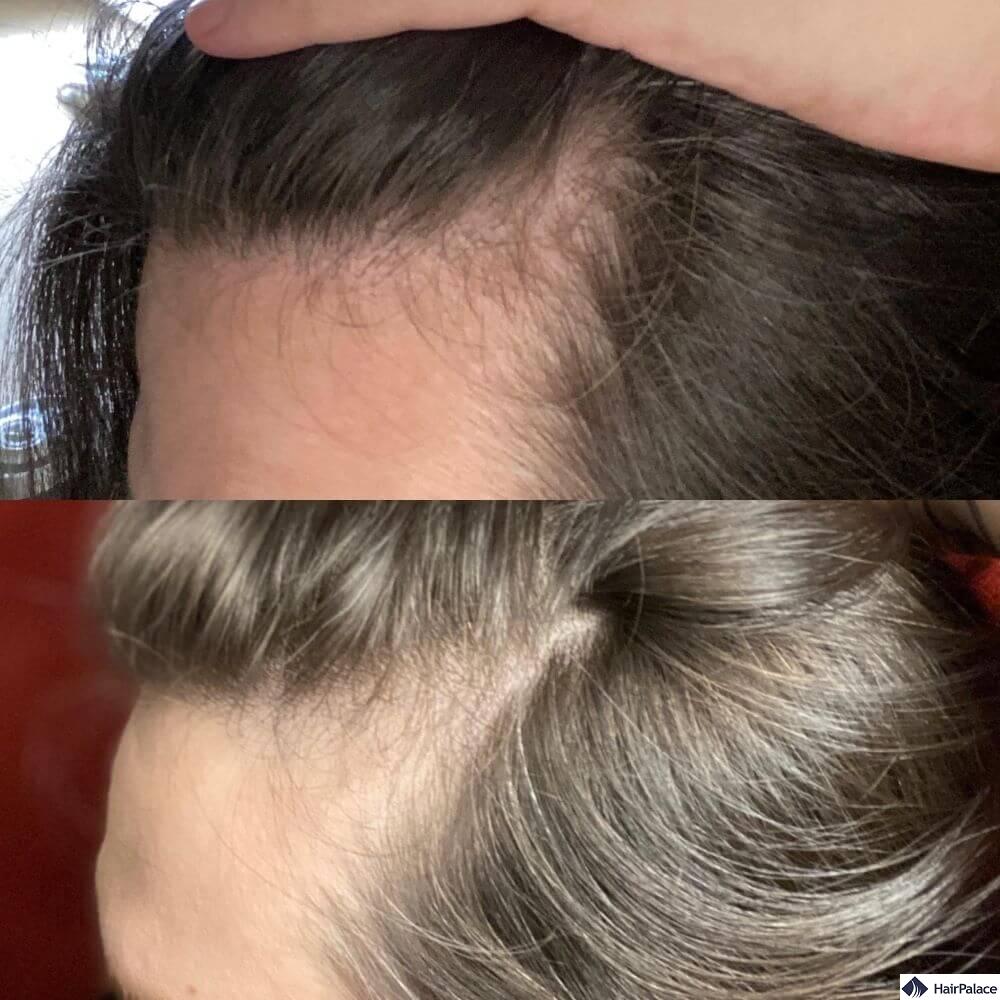Magnesium for Hair Growth: Could it be the Answer to Your Problems?

Magnesium is an essential mineral that plays a vital role in numerous bodily functions, but its impact on hair health is often overlooked.
So, is magnesium good for hair growth?
From supporting healthy hair follicles to reducing inflammation and stress-related shedding, magnesium can be a powerful ally in the fight against hair loss.
Whether taken through diet, supplements, or topical treatments, this mineral helps create the optimal environment for strong, healthy hair growth.
In this article, we’ll explore how magnesium works, its benefits for your scalp and strands, and the best ways to incorporate it into your hair care routine.
- What is magnesium?
- Can too much magnesium cause hair loss?
- Does magnesium help hair growth?
- Magnesium hair benefits
- What type of magnesium is best for hair growth?
- Before and after
- Magnesium hair loss treatment options
- Natural sources of magnesium
What is magnesium?

Magnesium is a crucial mineral that serves as a cofactor in hundreds of biochemical reactions in the body.
It plays a central role in energy production by participating in the synthesis of ATP (adenosine triphosphate), the body’s primary energy currency.
Magnesium is essential for the stability and activity of ATP, enabling proper metabolic function.
It also supports DNA and RNA synthesis, influences cellular replication, and assists in protein formation.
In the nervous system, magnesium helps regulate neurotransmitters and ion channels, maintaining proper communication between nerve cells.
Furthermore, it maintains the electrical balance across cell membranes, especially in muscle and heart cells, influencing contraction and rhythm.
By stabilising structures such as ribosomes and cell membranes, magnesium supports the coordination of essential cellular processes.
Magnesium and hair loss

A magnesium deficiency can lead to calcium buildup in soft tissues, including the scalp.
This can restrict blood flow and oxygen delivery to the hair follicles, leading to weakened hair shafts, slowed growth, and potential miniaturisation of follicles.
Magnesium deficiency may create an unhealthy scalp environment, contributing to hair loss over time.
Can too much magnesium cause hair loss?
There is no strong scientific evidence suggesting that excess magnesium directly causes hair loss.
The body typically regulates magnesium well, and any surplus from food is usually excreted naturally.
Although very high doses from magnesium supplementation may cause side effects like diarrhoea, nausea, or electrolyte imbalances, which could affect overall health.
Generally speaking, magnesium overload is not considered a direct cause of hair follicle damage or hair shedding.
Maintaining balanced magnesium levels is key to overall health and optimal hair support.
Does magnesium help hair growth?

Magnesium and hair growth are closely linked.
It contributes to hair growth by supporting the normal functioning of hair follicles at the cellular level.
Additionally, it aids in protein synthesis and cell division, which are essential for producing keratin, the structural protein that forms hair.
Magnesium helps prevent excess calcium buildup in the scalp, supporting proper blood flow to the follicles.
It also enhances circulation, reduces scalp inflammation, and combats oxidative stress, all of which can disrupt the hair growth cycle.
Furthermore, it plays a role in regulating cortisol, the stress hormone, helping to prevent stress-related hair loss.
While magnesium alone may not reverse significant hair loss, just like zinc, it creates favourable conditions for healthy hair growth.
Magnesium hair benefits
Whether you increase your dosage via natural sources such as green leafy vegetables or by taking magnesium supplements, this mineral offers multiple health benefits:
- Reduces hair loss: Prevents calcium buildup that can clog follicles.
- Supports follicle health: Enhances circulation and nutrient delivery.
- Fights scalp inflammation: Calms irritation and itching.
- Balances hormones: Helps regulate cortisol and stress responses.
- Strengthens hair structure: Aids in protein synthesis for stronger hair.
What type of magnesium Is best for hair growth?
The best types of magnesium for hair growth are those with high bioavailability that support systemic and scalp-specific health:
- Magnesium glycinate: Gentle on the stomach, well absorbed, and calming, helpful for stress related hair loss.
- Magnesium citrate: Easily absorbed and effective in restoring magnesium levels.
- Magnesium malate: Supports ATP production and may help with cellular energy and fatigue.
- Magnesium oil or Epsom salt baths: Applied topically or absorbed through the skin to improve scalp circulation and reduce calcium buildup.
Magnesium hair growth before and after

Magnesium hair loss treatment options
Here are some effective magnesium hair loss treatment options:
1. Topical magnesium (Magnesium oil or spray)
Applying an oil or a magnesium spray for hair growth can help reduce inflammation, improve blood circulation, and unclog hair follicles.
It’s a good option for targeting the scalp directly, especially if oral intake is insufficient or poorly absorbed.
2. Oral magnesium supplements
Magnesium supplements are a practical choice for those with dietary deficiencies or stress-related hair loss.
The effects of magnesium supplementation can aid you in balancing hormones, reducing cortisol, and supporting various bodily functions.
Oral magnesium supplements can promote hair growth and contribute to stronger strands over time.
A typical dose ranges from 200–400 mg per day, depending on individual needs.
3. Magnesium-rich diet
This supports long-term hair health and provides other systemic benefits like reduced inflammation and improved nutrient absorption.
4. Magnesium salt baths (Epsom Salt)
Soaking in a warm bath with Epsom salt (magnesium sulfate) allows magnesium to be absorbed through the skin, helping to relieve stress and promote relaxation.
This method can be a helpful addition to a holistic hair care routine.
Natural sources of magnesium

Here’s how to increase magnesium intake naturally:
- Leafy greens: Spinach, Swiss chard, kale
- Nuts & seeds: Almonds, cashews, pumpkin seeds, chia seeds, sunflower seeds
- Whole grains: Quinoa, brown rice, oats, whole wheat bread
- Legumes: Black beans, lentils, kidney beans, chickpeas
- Fish: Mackerel, salmon, halibut
- Other sources: Dark chocolate (70%+ cocoa), avocados, bananas, tofu
If you eat magnesium rich foods, you can often prevent hair loss due to deficiency.
- Gröber U, Schmidt J, Kisters K. Magnesium in Prevention and Therapy. Nutrients. 2015 Sep 23;7(9):8199-226. doi: 10.3390/nu7095388. PMID: 26404370; PMCID: PMC4586582.https://pubmed.ncbi.nlm.nih.gov/26404370/
- Fiorentini D, Cappadone C, Farruggia G, Prata C. Magnesium: Biochemistry, Nutrition, Detection, and Social Impact of Diseases Linked to Its Deficiency. Nutrients. 2021 Mar 30;13(4):1136. doi: 10.3390/nu13041136. PMID: 33808247; PMCID: PMC8065437.https://pubmed.ncbi.nlm.nih.gov/33808247/
- Wall D, Meah N, Fagan N, York K, Sinclair R. Advances in hair growth. Fac Rev. 2022 Jan 12;11:1. doi: 10.12703/r/11-1. PMID: 35156098; PMCID: PMC8808739.https://www.ncbi.nlm.nih.gov/pmc/articles/PMC8808739/
- NIH State-of-the-Science Panel. National Institutes of Health state-of-the-science conference statement: multivitamin/mineral supplements and chronic disease prevention. Am J Clin Nutr 2007;85:257S-264Shttps://www.ncbi.nlm.nih.gov/pubmed/17209206?dopt=Abstract
- Guo EL, Katta R. Diet and hair loss: effects of nutrient deficiency and supplement use. Dermatol Pract Concept. 2017 Jan 31;7(1):1-10. doi: 10.5826/dpc.0701a01. PMID: 28243487; PMCID: PMC5315033.https://www.ncbi.nlm.nih.gov/pmc/articles/PMC5315033/


